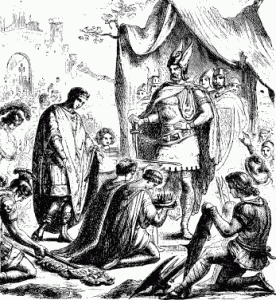Translating Vergil
Aeneid 1.305-309
At pius Aeneas, per noctem plurima volvens,
ut primum lux alma data est, exire locosque
explorare novos, quas vento accesserit oras,
qui teneant, nam inculta videt, hominesne feraene,
quaerere constituit, sociisque exacta referre.
Fitzgerald:
But the dedicated man,
Aeneas, thoughtful through the restless night,
Made up his mind, as kindly daylight came,
To go out and explore the strange new places,
To learn what coast the wind had brought him to
And who were living there, men or wild creatures—
For wilderness was all he saw—and bring
Report back to his company.
Mandelbaum:
But, nightlong, many cares have held the pious
Aeneas. And as soon as gracious daylight
is given to him, this is his decision:
to go out and explore the foreign country,
to learn what shores the wind has brought him to,
who lives upon this land—it is untilled—
are they wild beasts or men—and then to tell
his comrades what he has found.
West:
But all that night dutiful Aeneas was turning many things over in his mind. As soon as life-giving morning came, he decided to go out and explore this new land and bring back to his men a true account of the shores to which the winds had driven him, and the beasts and men who lived there, if there were any men, for he saw no signs of cultivation.
Aeneid 6.26-27:
Minotaurus inest, Veneris monimenta nefandae,
hic labor ille domus et inextricabilis error.
Fitzgerald:
… the Minotaur, get of unholy lust.
Here too, that puzzle of the house of Minos,
The maze none could untangle…
Mandelbaum:
the Minotaur,
a monument to her polluted passion
and here the inextricable labyrinth,
the house of toil, was carved …
West:
Here too is . . .the Minotaur . . . the memorial to a perverted love, and here is its home, built with such great labor, the inextricable labyrinth
Podcast: Play in new window | Download
Subscribe: Apple Podcasts |







